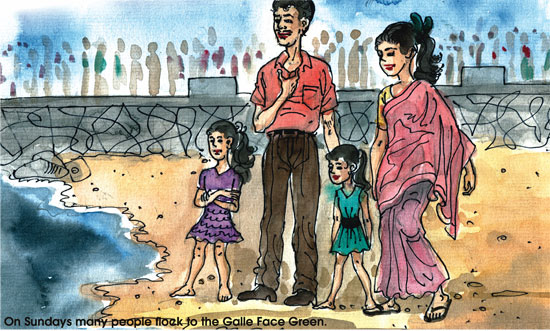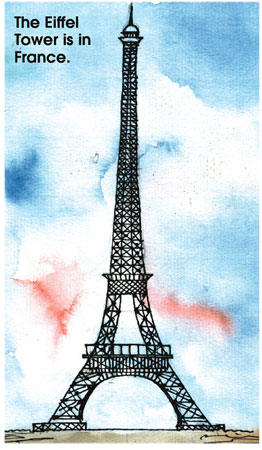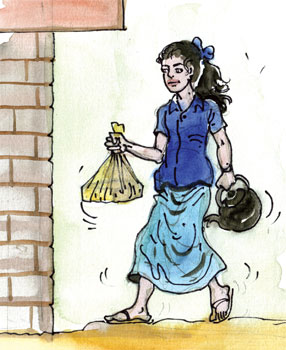|

by R. S. Karunaratne
How to use the definite article ‘The’
Most learners find it difficult to use the definite article ‘the’
with names, places and buildings. They have to learn the rules and also
the exceptions. As a rule, we do not use ‘the’ with names of people,
languages and most places.
People

Lucy is a beautiful girl.
Sam attends an international school.
Brian prefers tea to coffee.
Smith applied for a loan to put up a house.
Brenda is a nurse at a private hospital.
Languages
Most people in the city speak English.
Sinhala and Tamil are official languages in Sri Lanka.
Chandani speaks Hindi quite fluently.
I found it difficult to learn Chinese.
French is taught in most international schools.
Places
Eva is from Germany.
Fidel Castro lives in Cuba.
Have you been to Queensland?
Where is Lake Geneva?
Mount Everest is the highest mountain in the world.
The Opposition is holding a rally at Hyde Park.
On Sundays many people flock to the Galle Face Green.
Sea Street is well known for jewellery shops.
We took a boat ride on Lake Victoria.
My friend John works in Denmark.
We use ‘the’ with some place names.
Camels can be seen in the Sahara Desert.
The Mahaweli is the longest river in Sri Lanka.
Some hermits are meditating in the Himalayas.
Sri Lanka is an island in the Indian Ocean.
Have you been to the Netherlands?
The United States is the most powerful country.
Queen Elizabeth lives in the United Kingdom.
Japan is in the Far East.
Many Sri Lankans are working in the Middle East.
The Smiths are living in a small town near the Mediterranean.
We use ‘the’ with most names of buildings.
Tourists are staying at the Hilton Hotel.
The Eiffel Tower is in France.
We visited the British Museum.
Shah Jehan built the Taj Mahal.
Have you been to the Globe Theatre?
We do not use ‘the’ with names of airports, stations, cathedrals,
universities,
palaces, castles and schools.
The plane took off from Mattala Airport.
I studied at Kelaniya University.

Daisy attends Lyceum International School.
Queen Elizabeth lives at Buckingham Palace.
Have you been to St. Paul’s Cathedral?
My son attends S. Thomas’ College, Mt. Lavinia.
Shall we go to McDonalds for refreshments?
Match words and meanings
Here’s an exciting way to enrich your vocabulary. Match the words in
column ‘A’ with their meanings in column ‘B’ and check your answers with
the key. The first one has been done for you.
[Column A]
Y 1. coupling
... 2. courier
... 3. courteous
... 4. courtier
... 5. coven
... 6. covenant
... 7. covert
... 8. coward
... 9. cowboy
... 10. cowhide
... 11. cowshed
... 12. coy
... 13. crackpot
... 14. cradle
... 15. craft
... 16. crafty
... 17. crammed
... 18. cranial
... 19. crank
... 20. cranny
... 21. crap
... 22. crash
... 23. crass
... 24. crave
... 25. craze
[Column B]
A. to have a strong want for something
B. an extremely popular temporary activity
C. an accident
D. nonsense
E. someone who has strange ideas
F. of the skull
G. clever in a dishonest way
H. a small bed for a baby
I. intentionally keeping something secret
J. leather made from the cow’s skin
K. someone who is too eager to avoid danger
L. a formal agreement
M. a companion of a king or queen
N. a person who carries messages
O. stupid
P. a small narrow opening
Q. full of people or things
R. skill and experience
S. a stupid person
T. a building where cows are kept
U. a person whose job is to take care of cattle
V. hidden or secret
W. a group of witches
X. polite and respectful
Y. a device which joins two things together
Key:
2. N 3. X 4. M 5. W 6. L 7. V 8. K 9. U 10. J 11. T 12. I 13. S 14. H
15. R 16. G 17. Q 18. F 19. E 20. P 21. D 22. C 23. O 24. A 25. B
How to use two or more nouns together
In English we often use one noun before another noun.
Mother uses a bread knife to cut bread.
Colvin's father is a bus driver.
The local authorities maintain the street lights.
She cooks following the instructions in a cookery book.
|

Aunt Merle brought sweets and a large teapot. |
I am going to hold my birthday party on Sunday.
Where shall we go during the tea break?
Sometimes we use the two nouns together.
Aunt Merle brought sweets and a large teapot.
The first noun is usually singular.
Father walked into a souvenir shop before starting his journey.
Is there an animal hospital close by?
They are fixing a letterbox on the gate.
Sometimes the first noun is plural.
Are you a member of any sports club?
A goods train does not carry passengers.
I have to attend a sales conference tomorrow.
Note the following
A teacup is a cup for holding tea.
A cup of tea is a cup full of tea.
A cigarette packet is an empty container.
You can take a cigarette from a packet of cigarettes.
A milk bottle is used to store milk.
We usually keep a bottle of milk in the refrigerator.
A noun with an ‘-ing’ can be used with another noun.
The tourist was carrying a sleeping bag.
We have a waiting room for visitors.
I am going to buy a washing machine.
Sometimes we can join more than two nouns.
They have a large glass coffee table.
Have you been to the Sydney Opera House?
This bedroom carpet is very expensive.
They are still preparing the holiday train timetable.
Our Assistant Computer Technology Manager is on leave today.
More examples of two or three nouns together.
I use a wooden office chair.
Can you lend me your tennis racket.
How much is this alarm clock?
You need a licence to ride a motorcycle.
We use a luggage trolley at the airport.
This is an interesting newspaper article.
I always wear cotton shirts.
You need a shopping bag to carry all these items.
He is a salesman at a shoe shop.
We sat at a corner table of the new hotel.
She is a computer operator.
Is there a train station near here?
Keep medicine in a glass bottle.
They are building a stone wall.
The hotel has a tourist information centre.
Carry a bath towel when you go to the wash-room.
The mechanic is in his working clothes.
Do you have a credit card?
I am going to see a horse race.
Quiz on idioms
An idiom is a special kind of phrase. It is a group of words which
have a different meaning when used together from the one it would have
if the meaning of each word were taken individually. Tick the meaning of
the idioms printed in bold type and check your answers with the key.
1. If a film is in the can ...
(a) it has been successfully completed
(b) it has not been successfully completed
(c) it has been banned
2. If someone is burning the candle at both ends ...
(a) they are wasting their resources
(b) they are going to have problems because they are trying to do too
much
(c) they are trying out new strategies
3. If someone can't hold a candle to another ...
(a) the first person is physically weak
(b) the first person is much better than the other person
(c) the second person is much better than the first person
4. If something is not worth the candle ...
(a) it is not worth the effort needed to achieve something
(b) it is worth the effort needed to achieve something
(c) it is useless trying to achieve anything
5. If someone is like a child in a sweet store ...
(a) they are bound to do what they are asked
(b) they are restricted by rules of morality
(c) they do whatever they want
6. If you refer to soldiers in a war as cannon fodder ...
(a) they are sent to fight in the most dangerous areas
(b) they are sent to fight in safe areas
(c) they are sent to fight with heavy weapons
7. If you describe someone as a loose cannon ...
(a) his behaviour is commendable
(b) his behaviour is predictable
(c) his behaviour is unpredictable
8. If you paddle your own canoe ...
(a) you want to keep away
(b) you want to be controlled
(c) you control what you want to do without interference
9. If you go cap in hand to someone ...
(a) you ask for money or help from them
(b) you want to fight with them
(c) you want to expose their activities
10. If you put your thinking cap on ...
(a) you seek help from others to solve your problems
(b) you fail to think about your problems
(c) you try your hand to solve a problem by thinking about it
Key:
1. (a) 2. (b) 3. (c) 4. (a) 5. (c) 6. (a) 7. (c) 8. (c) 9. (a) 10.
(c) |

